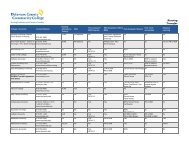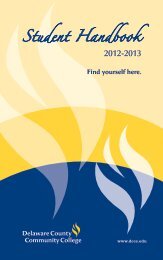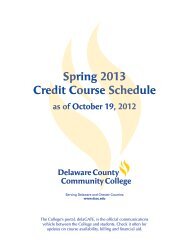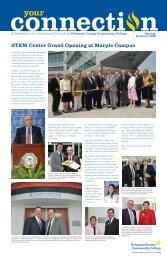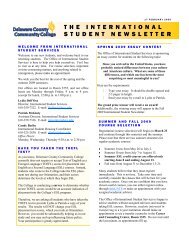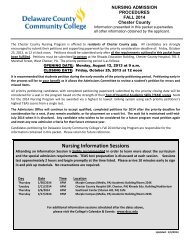2010 Catalog - Delaware County Community College
2010 Catalog - Delaware County Community College
2010 Catalog - Delaware County Community College
Create successful ePaper yourself
Turn your PDF publications into a flip-book with our unique Google optimized e-Paper software.
COURSE DESCRIPTIONS 143<br />
Upon successful completion of this course, the student<br />
should be able to:<br />
• Install and troubleshoot a server installation.<br />
• Identify and explain the components of a Upgrade<br />
and/or Migration.<br />
• Modify server components for server management and<br />
optimization.<br />
• Configure and troubleshoot client management.<br />
• Design an eDirectory structure.<br />
• Define and manage IP and Internet services.<br />
• Explain database repair procedures using various<br />
NetWare tools.<br />
Prereq. NET 230<br />
4 Credits 3 Weekly Lecture Hours<br />
2 Weekly Laboratory Hours<br />
NET 232<br />
Novel Network Design &<br />
Implementation<br />
This course provides students the necessary skills to<br />
design and create a NetWare 6.x. implementation plan.<br />
Students will consider design strategies and implementations<br />
and complete a NetWare installation. Students<br />
will also learn Novell server tools. The class will focus<br />
on Novell's eDirectory including preparation, tree<br />
design, troubleshooting and accessibility.<br />
Upon successful completion of this course, the student<br />
should be able to:<br />
• Perform a Netware 6.x server install.<br />
• Develop a migration plan based on tools provided<br />
with NetWare 6.x.<br />
• Define advanced Novell Storage Management<br />
and implementation.<br />
• Describe iFolder configuration management.<br />
• Develop a Novell Cluster Services solution.<br />
• Describe and manage Novell troubleshooting tools.<br />
• Describe and implement Novell eDirectory preparation,<br />
tree design, troubleshooting and accessibility.<br />
Prereq. NET 231<br />
4 Credits 3 Weekly Lecture Hours<br />
2 Weekly Laboratory Hours<br />
NET 241<br />
Network Protocols TCP/IP<br />
This course gives the students the skills necessary to<br />
procure an Internet address, configure a Subnet mask,<br />
assign IP addresses and troubleshoot common IP address<br />
problems. The course also gives students the skills<br />
necessary to use common TCP/IP applications including<br />
Telnet and FTP.<br />
Upon successful completion of this course, students<br />
should be able to:<br />
• Explain the differences between the DoD Protocol model<br />
and the OSI model.<br />
• Discuss data multiplexing, switching, bridging and<br />
routing technologies.<br />
• Explain IP addressing using dotted decimal notation<br />
and assign IP addresses.<br />
• Identify and troubleshoot datagram delivery, routing<br />
tables, Exterior Gateway Protocol (EGP) and Internet •<br />
Control Message Protocol (ICMP).<br />
• Discuss data stream maintenance, windowing, and host<br />
and network file setups.<br />
• Identify and troubleshoot Domain Name Services (DNS),<br />
File Transfer Protocol (FTP), Trivial File Transfer Protocol<br />
(TFTP), Telnet, Simple Network Management Protocol<br />
(SNMP), and Simple Mail Transfer Protocol (SMTP).<br />
• Configure hosts, networks, gateways, protocols<br />
and services.<br />
• Discuss BOOTP, DHCP, SLIP and PPP.<br />
• Discuss planning technologies for router configuration,<br />
IP tunneling, DHCP servers and SNMP.<br />
Prereq. or Coreq. NET 231<br />
4 Credits 3 Weekly Lecture Hours<br />
2 Weekly Laboratory Hours<br />
(NUS) Nursing<br />
NUS 102 Nursing Mathematics:<br />
Dosage Calculation and Drug Preparation<br />
Nursing Mathematics covers adult drug preparation,<br />
dosage calculation, and intravenous fluids and medications<br />
administration. Measurement requirements, system<br />
conversions, oral and parenteral dosage calculations, and<br />
intravenous fluid flow rates are covered in detail. Nursing<br />
implications for drug administration are emphasized in<br />
every unit including a brief overview of drug label interpretation<br />
and pediatric and geriatric dosage considerations.<br />
Upon successful completion of this course, students<br />
should be able to:<br />
• Calculate mathematical problems working with fractions,<br />
decimals, and percents.<br />
• Solve drug dosage problems using ratio and proportion.<br />
• Use system conversions (metric and household) for<br />
volume and weight problems.<br />
• Calculate oral and parenteral dosage problems in the<br />
same system and in different systems.<br />
• Measure drugs administered in units.<br />
• Identify pediatric and geriatric considerations for<br />
drug administration.<br />
• Calculate intravenous fluid flow rates (drops per minute<br />
and milliliters per hour) and infusion times.<br />
• Identify abbreviations and symbols for drug preparation<br />
and administration.<br />
• Accurately read and interpret a drug label in relation to<br />
a medication order.<br />
Prereq. MAT 060<br />
1 Credit 1 Weekly Lecture Hours<br />
NUS 110<br />
Fundamentals of Nursing<br />
The nursing process is presented as the method<br />
utilized by the nurse in health maintenance of individuals<br />
across their life span and that of their families. Knowledge<br />
and skills essential to nursing practice in meeting<br />
individual's basic needs are emphasized. Clinical<br />
laboratory experiences incorporate the use of advanced<br />
technologies in order to provide competent care to<br />
patients with common health maintenance needs.<br />
Upon successful completion of this course, students<br />
should be able to:<br />
• Identify fundamental concepts of nursing practice used to<br />
administer therapeutic nursing interventions to patients<br />
of varied cultures across the life span.<br />
• Identify how individuals respond to need interferences<br />
to achieve and maintain an optimum level of wellness<br />
on the health-illness continuum.<br />
• Identify how an individual's basic needs serve as a motivator<br />
for biophysical functioning and psychosocial behavior.<br />
• Implement fundamental concepts of nursing practice to<br />
promote and maintain health in patients.<br />
• Demonstrate use of fundamental nursing skills utilizing<br />
advanced technologies when caring for patients in<br />
structured health care settings.<br />
Coreq. BIO 150, ENG 100, PSY 140, NUS 102<br />
8 Credits 4 Weekly Lecture Hours<br />
8 Weekly Laboratory Hours<br />
NUS 111 Nursing Concepts and<br />
Practice I<br />
Students are provided opportunities to integrate knowledge<br />
of facts, principles, and advanced technologies acquired in<br />
general and nursing education courses previously studied.<br />
Application of biophysical and psychosocial factors form<br />
the basis of assessing patient's needs, and diagnosing,<br />
planning, implementing and evaluating the nursing care of<br />
patients with common medical-surgical problems. Structured<br />
clinical laboratory experiences are provided concurrent with<br />
nursing theory.<br />
Upon successful completion of this course, students<br />
should be able to:<br />
• Describe how interference with oxygenation affects<br />
patients and influences the nursing process.<br />
• Describe how interference with safety/security affects<br />
patients and influences the nursing process.<br />
• Describe how interference with the absorption and<br />
utilization of nutrients affects patients and influences<br />
the nursing process.<br />
• Describe how need interference with regulatory function<br />
affects patients and influences the nursing process.<br />
• Describe how need interference with activity affects<br />
patients and influences the nursing process.<br />
• Demonstrate critical thinking skills utilizing advanced<br />
technologies when caring for patients with common<br />
health problems in a variety of structured health<br />
care settings.<br />
Prereq. NUS 110, Coreq BIO 151<br />
10 Credits 4 Weekly Lecture Hours<br />
12 Weekly Laboratory Hours<br />
NUS 205<br />
Perioperative Nursing<br />
The knowledge and technique necessary to assume<br />
responsibilities of the perioperative nurse are emphasized<br />
in this broad-based yet comprehensive orientation to the<br />
operating room and the perioperative role. Standards of<br />
patient care in the operating room are explored and<br />
identified. Assessment of patient needs and implementation<br />
of nursing interventions are emphasized. Collaborative<br />
decision making is reviewed relative to total intraoperative<br />
care. Subject material guides the learner to provide for<br />
and contribute to patient safety through control of internal<br />
and external environment, biological testing and product<br />
evaluation, as well as to assist the patient with the<br />
management of anxiety through the principles of biological,<br />
physical and social sciences. The <strong>College</strong> recognizes the<br />
standards of perioperative nursing practice of the AORN<br />
as the conceptual basis of specialty practice in the OR.<br />
Upon successful completion of this course, students<br />
should be able to:<br />
• Describe the psychosocial influences affecting the<br />
patient's response to surgical intervention.<br />
• Demonstrate knowledge necessary to implement the<br />
perioperative role.<br />
• Discuss principles of asepsis used in providing patient<br />
care during the intraoperative period.<br />
• Analyze the conceptual basis of role function as an<br />
interdisciplinary team member in delivery of care to the<br />
operative patient.<br />
• Plan nursing activities that reflect the nursing process in<br />
providing care to the patient undergoing surgical<br />
intervention.<br />
• Relate nursing, legal and ethical boundaries in the<br />
practice of professional nursing in the operating room.<br />
Prereq. RN Licensure or eligibility<br />
3 Credits 3 Weekly Lecture Hours<br />
NUS 206<br />
Perioperative Preceptorship<br />
The skills needed by the nurse to practice professional<br />
nursing in the operating room are emphasized. Under the<br />
tutelage of an operating-room nurse preceptor, with the<br />
guidance of the <strong>College</strong> faculty facilitator, the learner is<br />
introduced to the activities performed by the nurse in the<br />
operating room throughout the patient's surgical experience.<br />
Learners will function within the scope and multiple<br />
dimensions of the perioperative role as defined in the<br />
preceptor institution.<br />
Working with guidelines developed by the <strong>College</strong> in<br />
collaboration with a local AORN advisory board, the<br />
preceptorship is a 15-day clinical practicum. Preceptors<br />
are selected by the OR nurse manager in the preceptor<br />
hospital. Preceptorship sites may be arranged by the<br />
learner or selected from the <strong>College</strong>'s preceptor affiliate<br />
sites. Schedules for clinical activities are mutually<br />
arranged by students and preceptor.




